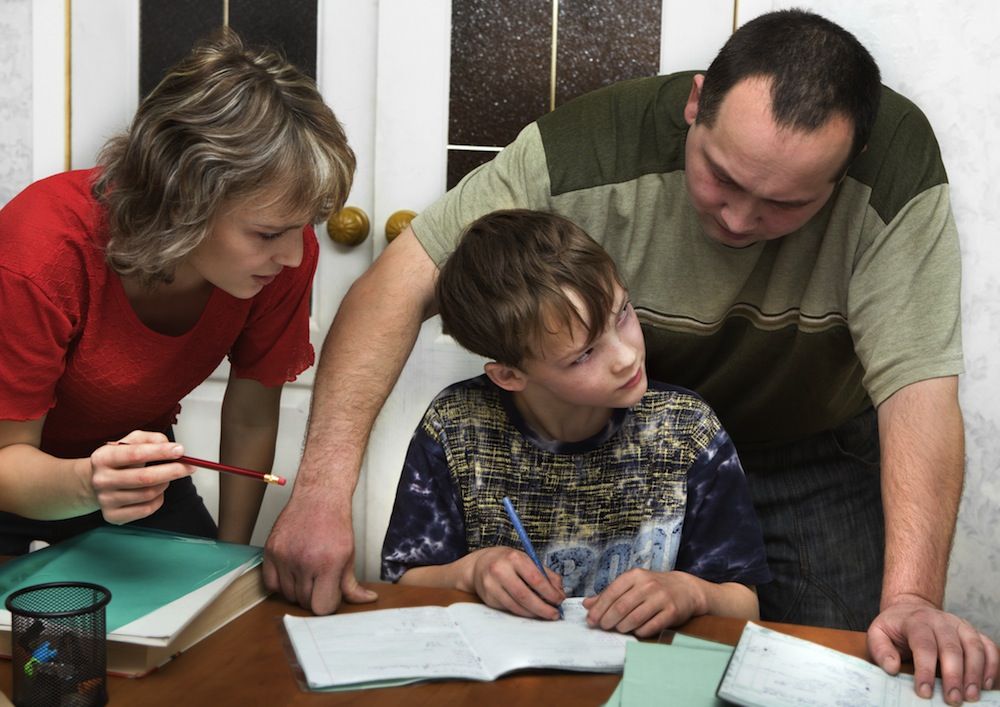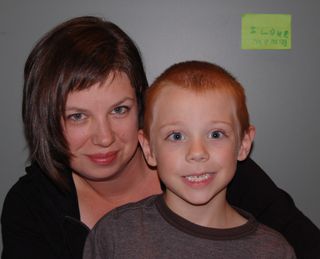The ADHD Rollercoaster: Stressed Parents Need Help, Too

Ever since the second day her son went to kindergarten, Penny Williams has worried about him. That's the day Williams, a real estate broker in Asheville, N.C., got her first call from her child's teacher. Luke wasn't ready for school, the teacher told Williams. He couldn't sit still and didn't want to participate. The insinuation, Williams said, was that she had failed as a parent.
Luke, now 8, would later be diagnosed with attention deficit hyperactivity disorder (ADHD), a neurological disorder marked by distraction, disorganization, impulsivity and, as the name suggests, hyperactivity. About 3 percent to 5 percent of school-age children in the U.S. have ADHD.
Since the diagnosis, Williams has immersed herself in those children's worlds. She edits a group blog of parents with ADHD kids at adhdmomma.blogspot.com and devours books about ADHD, trying to understand her child's mind.
"He has a really high IQ and he's really gifted, and he comes home from school and says how stupid he is," Williams told LiveScience, referring to Luke. "It's hard to watch your kid struggle … It adds stress and anxiety."
A new study finds that Williams is far from alone in her sensitivity to her son's moods and needs. Parents of children with ADHD are more in tune to their child's behavior than parents with neurotypical children, according to research published in June in the Journal of Family Psychology. All parents' moods ebb and flow based on how their children are behaving, said study researcher Candice Odgers, a psychologist at the University of California, Irvine. But the link between a mother's mood and her child's behavior is stronger when the kid has ADHD.
The problem is that those ups and downs can take a toll on parents.
"If you think about what it's like to parent a child with ADHD, it requires a kind of constant vigilance, a high level of energy," Odgers told LiveScience. "This is important, because we know that stress and the burden of caregiving in general are associated with a whole host of problems, mental health and physical problems." [Top 10 Mysteries of the Mind]
Sign up for the Live Science daily newsletter now
Get the world’s most fascinating discoveries delivered straight to your inbox.
The stress rollercoaster

The emotional cost of parenting a child with ADHD may be getting steeper thanks to widespread budget cuts that are limiting school resources in several states. There are not yet any studies on the effect of state budget cuts on special needs children, but California psychologist Lara Honos-Webb, author of "The Gift of ADHD: How to Transform Your Child's Problems Into Strengths" (New Harbinger Publications, 2005), said families are feeling the pinch.
"Due to cuts in the schools, parents are desperately trying to get resources that are not there," Honos-Webb told LiveScience.
Those sorts of barriers add to the challenges that ADHD already brings to parents: A higher-than-usual risk of divorce, increased stress levels and a decreased sense of their own competence.
In order to develop better support for these parents, Odgers and her colleagues wanted to understand how parental stress rises and falls in real time. Led by UC Irvine psychologist Carol Whalen, the researchers asked 51 moms of kids with ADHD and a control group of moms with kids without special needs to answer surveys about their child's behaviors and their own moods every 30 minutes while their kids were at home for a week. Using PDAs with built-in reminder alarms, the children also filled out surveys about their own moods and behaviors.
Parental stress did indeed fluctuate with the child's self-reported bad behavior, the researchers found. This was especially true when parents of ADHD kids had mental health problems of their own or more family burdens in general. [Inside the Brain: A Journey Through Time]
Mother's ratings of their child's behaviors coincided with the child's own ratings, so when a mom reported that her child was angry or restless, disobedient ("my child argued") or hyperactive ("my child talked too much"), the child's diary usually agreed. The child behaviors most likely to cause distress in mom were hyperactivity, lack of concentration, or anger and disobedience.
Optimistic ADHD
The results emphasize the need to consider the whole family dynamic when treating an ADHD child, Odgers said. Doing so is necessary both for the child's sake and for the parents', as stressed parents aren't as supportive of their children.
"There are these really important links between children's behavior and mom's mood and levels of stress," Odgers said. "We know from a lot of other research that mom's mental health is a very, very strong predictor of her parenting style."
Honos-Webb recommends that families with ADHD children work hard to see the positive strides that their children are making. That involves focusing on what can be done to help rather than what a child is doing wrong. It's also important to encourage the child's hobbies and strengths, Honos-Webb said. She also recommends "high-octane connection time" between parents and children to break cycles of frustration and punishment.
For Williams, finding Luke's strengths is no problem at all. He's a smart, inquisitive and open-hearted child, she said. If he sees another kid crying on the playground, he'll often go over to comfort them, she said: "He really has this need to fix things and make it better."
But the stress is still there as she watches her son struggle academically. He will try out a new school next year, moving from a public school that Williams said wasn't working out to a private one that is better-focused on the requirements of special needs kids. The decision has caused her lots of anxiety. She also finds herself facing scorn from strangers when Luke has temper tantrums in public places.
For her, the best coping mechanism has been finding support among other parents who understand the challenges of an ADHD child. But she's also found that parenting Luke has shifted something in her.
"When I used to see a kid acting out in a restaurant, I used to think the same thing most people think, 'Why can't their parents control them?'" Williams said. "And then I had a kid who did that, and I realized there's a reason. … It makes you a much more understanding person."
You can follow LiveScience senior writer Stephanie Pappas on Twitter @sipappas. Follow LiveScience for the latest in science news and discoveries on Twitter @livescience and on Facebook.

Stephanie Pappas is a contributing writer for Live Science, covering topics ranging from geoscience to archaeology to the human brain and behavior. She was previously a senior writer for Live Science but is now a freelancer based in Denver, Colorado, and regularly contributes to Scientific American and The Monitor, the monthly magazine of the American Psychological Association. Stephanie received a bachelor's degree in psychology from the University of South Carolina and a graduate certificate in science communication from the University of California, Santa Cruz.


